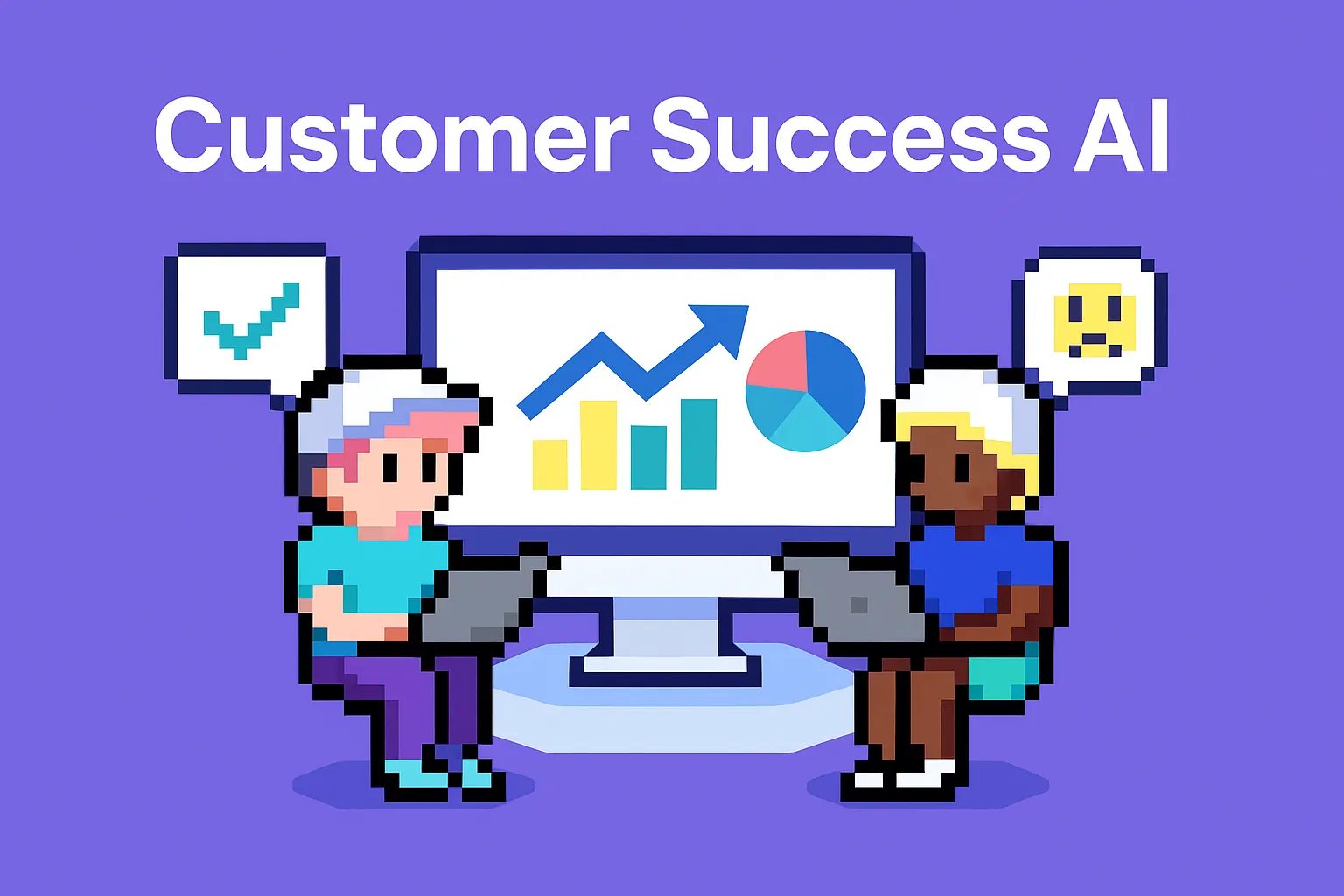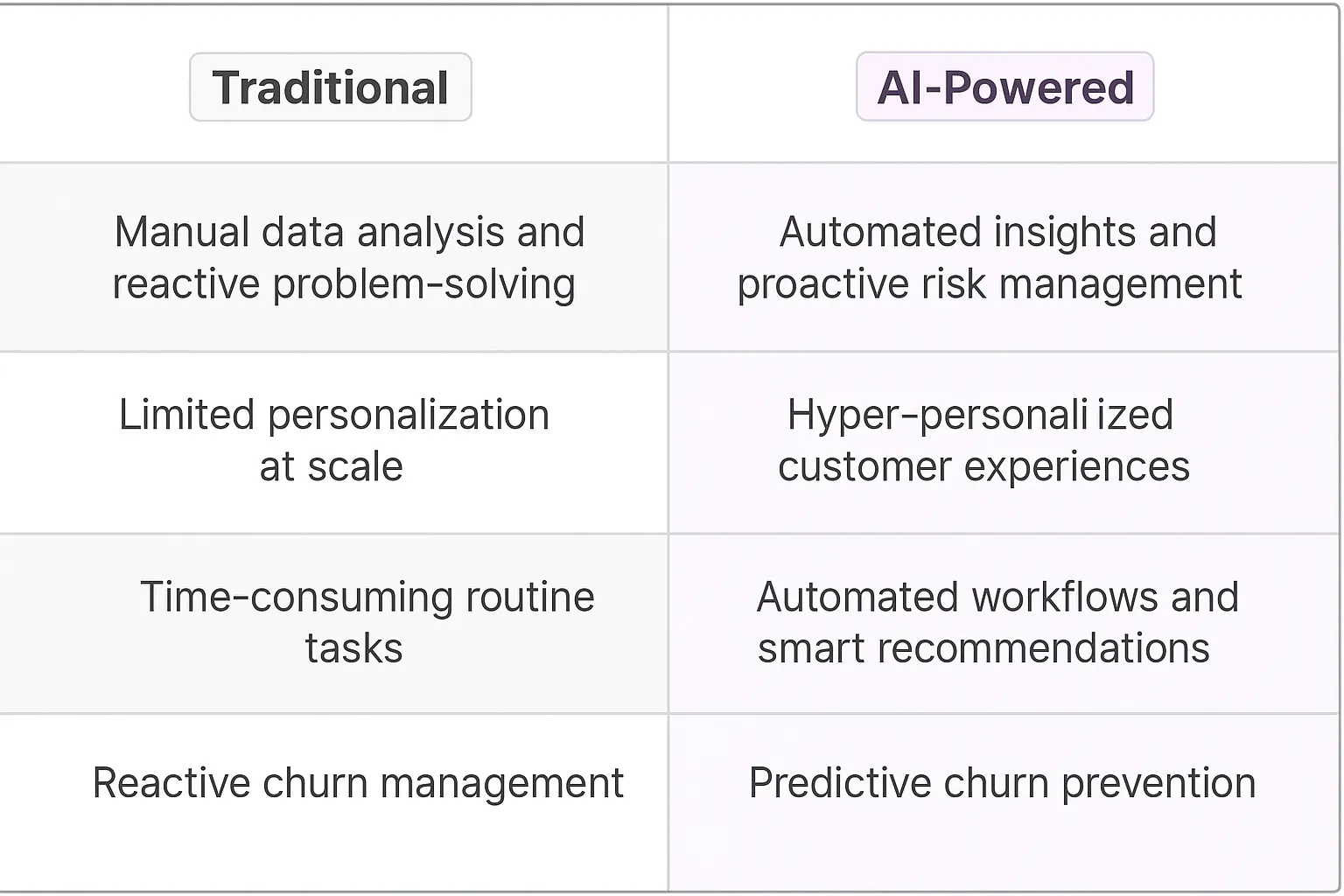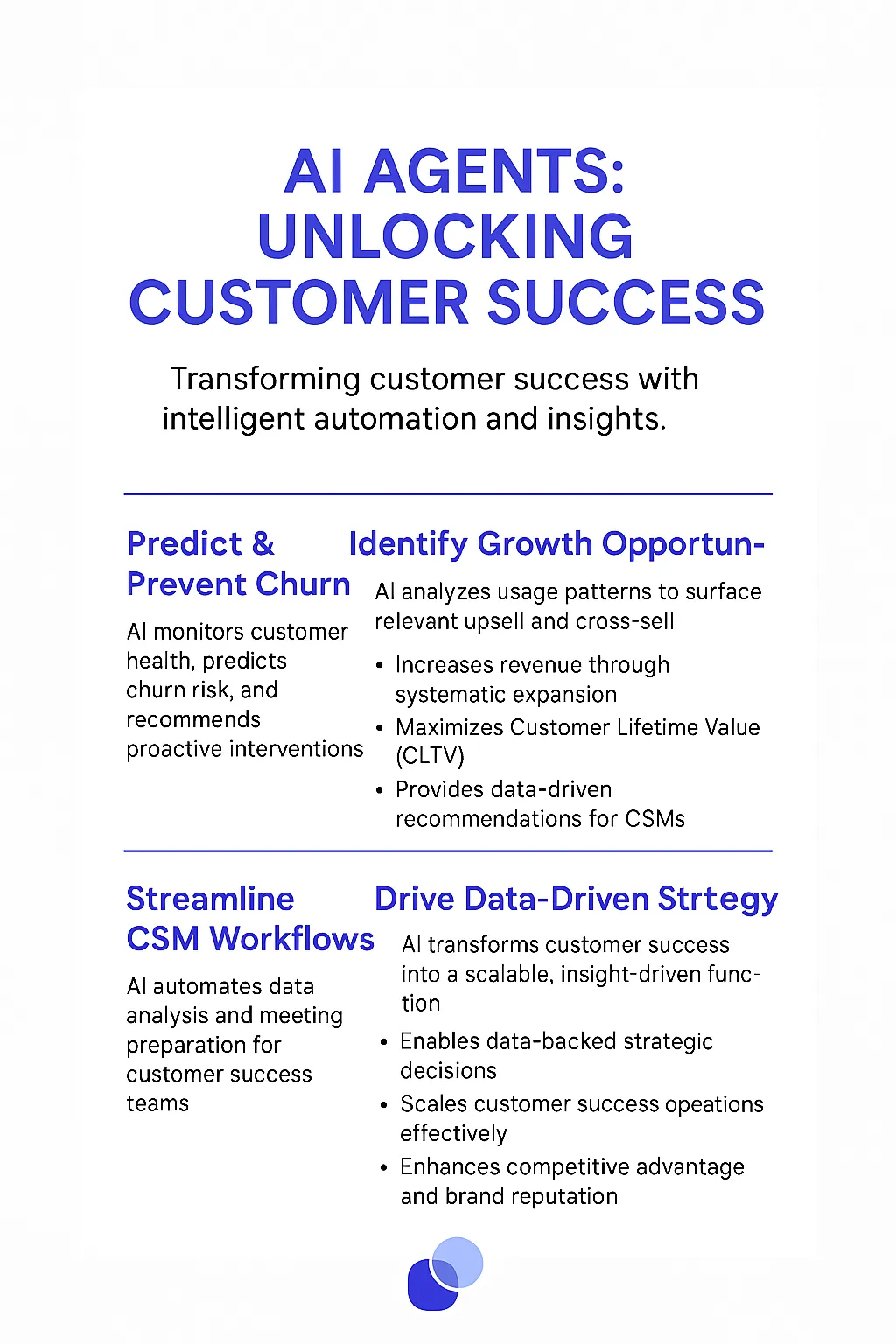A Customer Success Manager (CSM) is a pivotal role in SaaS and subscription-based businesses, focused on ensuring customers achieve their desired outcomes while using a company's product or service. CSMs are relationship-builders, product experts, and strategic advisors rolled into one. They work to drive customer satisfaction, reduce churn, and identify opportunities for expansion, ultimately contributing to the company's growth and profitability.
Customer Success Managers typically possess a unique blend of skills and responsibilities:1. Relationship Management: Building and maintaining strong, trust-based relationships with key stakeholders in customer organizations.2. Product Expertise: Deep understanding of the product's features, benefits, and best practices for implementation.3. Data Analysis: Ability to interpret usage data and customer health metrics to identify risks and opportunities.4. Strategic Planning: Developing and executing plans to help customers achieve their goals and maximize value from the product.5. Upsell and Cross-sell: Identifying and pursuing opportunities to expand customer accounts.6. Onboarding and Training: Guiding new customers through the implementation process and ensuring smooth adoption.7. Proactive Problem-solving: Anticipating and addressing potential issues before they impact customer satisfaction.8. Advocacy: Acting as the voice of the customer within the organization to drive product improvements and enhance the overall customer experience.

Before AI agents entered the scene, customer success managers were drowning in a sea of spreadsheets, CRM data, and endless email threads. They'd spend hours manually sifting through customer interactions, trying to piece together the puzzle of user satisfaction and churn risk. It was like playing detective with one hand tied behind your back – time-consuming, inefficient, and prone to human error.
The typical workflow involved juggling multiple tools: ticketing systems for support issues, analytics dashboards for usage data, and communication platforms for team collaboration. CSMs were constantly context-switching, trying to maintain a holistic view of each customer's journey. This fragmented approach often led to missed opportunities and reactive rather than proactive customer management.
Enter AI agents – the game-changers that are redefining the customer success landscape. These digital teammates are like having a team of data scientists, analysts, and relationship managers rolled into one, working 24/7 to elevate your customer success game.
First off, AI agents excel at pattern recognition. They can analyze vast amounts of customer data analysis in real-time, identifying trends and potential issues before they escalate. This predictive power allows CSMs to shift from firefighting to fire prevention, addressing customer needs proactively and significantly reducing churn risk.
Moreover, AI agents are masters of personalization at scale. They can tailor communications and recommendations for each customer based on their unique usage patterns, industry, and goals. This level of customization was previously impossible without an army of CSMs – now it's achievable with a lean, AI-augmented team.
Another killer feature is the AI agent's ability to automate routine tasks. From scheduling follow-ups to generating QBRs (Quarterly Business Reviews), these digital teammates free up CSMs to focus on high-value, strategic activities that truly move the needle for customers and the business.
Perhaps most importantly, AI agents serve as a central nervous system for customer data. They integrate seamlessly with existing tools, creating a single source of truth that eliminates silos and provides CSMs with a 360-degree view of each account. This holistic perspective enables more informed decision-making and helps CSMs identify upsell and cross-sell opportunities with laser precision.
In essence, AI agents are transforming customer success from a reactive, manual process into a proactive, data-driven strategy. They're not replacing CSMs – they're empowering them to operate at a higher level, driving customer satisfaction, retention, and ultimately, revenue growth. As these AI teammates continue to evolve, we're likely to see a new breed of hyper-efficient, AI-native CSMs who can manage larger portfolios with greater impact than ever before.

Customer Success Managers (CSMs) are the unsung heroes of SaaS companies, bridging the gap between product and user. AI agents are poised to become their digital teammates, amplifying their impact across the customer lifecycle. Let's dive into some game-changing use cases:
Beyond high-level processes, AI agents can supercharge a CSM's daily workflow with targeted task assistance:
The integration of AI agents into the Customer Success workflow isn't about replacing human touch – it's about amplifying it. By offloading routine tasks and providing data-driven insights, these digital teammates free up CSMs to focus on what they do best: building relationships, solving complex problems, and driving real business outcomes for their customers.
As we've seen in other domains, the most successful CSMs will be those who learn to effectively collaborate with AI, leveraging its strengths to enhance their own. The future of Customer Success isn't human vs. machine, but human and machine working in concert to deliver unprecedented value.

AI agents are reshaping the landscape of customer success management, offering game-changing capabilities across diverse sectors. These digital teammates aren't just tools; they're transformative forces that elevate the entire customer experience ecosystem. Let's dive into some industry-specific scenarios where AI agents are making waves in customer success:
From SaaS platforms to e-commerce giants, AI-powered customer success managers are becoming the secret weapon for companies looking to scale their support operations without sacrificing quality. These AI agents are adept at handling the nuanced dance of customer relationships, from onboarding to churn prevention, all while maintaining a personal touch that feels surprisingly human.
What's particularly exciting is how these AI agents are adapting to the unique challenges of different industries. They're not one-size-fits-all solutions, but rather chameleons that can speak the language of fintech one moment and switch to healthcare jargon the next. This versatility is key in a world where customer expectations are sky-high and industry-specific knowledge can make or break a customer relationship.
As we explore these use cases, keep in mind that we're just scratching the surface. The potential for AI in customer success is vast, and we're likely to see even more innovative applications emerge as the technology continues to evolve. So, let's take a tour of how AI agents are revolutionizing customer success across various industries, shall we?
The fintech industry is ripe for disruption, and Customer Success Manager AI agents are poised to be the game-changers. In the high-stakes world of financial technology, where user trust and satisfaction are paramount, these digital teammates can transform how companies nurture and grow their customer relationships.
Take a rapidly scaling neobank, for instance. As they onboard thousands of new users daily, maintaining personalized attention becomes a Herculean task. Enter the Customer Success Manager AI agent. This digital teammate can analyze vast amounts of user data in real-time, identifying patterns in spending habits, savings goals, and investment preferences.
The AI agent doesn't just crunch numbers; it crafts tailored financial advice and product recommendations. Imagine a user who consistently overspends on dining out. The AI could nudge them towards a premium account with cashback on restaurant purchases, simultaneously improving their financial health and the bank's bottom line.
But here's where it gets interesting: these AI agents can predict churn before it happens. By analyzing subtle changes in user behavior - decreased login frequency, reduced transaction volume, or increased support tickets - the AI can flag at-risk accounts. It then orchestrates proactive outreach, perhaps offering a loyalty bonus or scheduling a check-in with a human advisor.
The beauty of this system lies in its scalability. As the neobank expands globally, the AI agent can adapt to cultural nuances and local financial regulations, ensuring compliance while maintaining a personalized touch. It's like having a army of hyper-intelligent, tireless customer success managers working 24/7 across time zones.
This isn't just about efficiency; it's about creating a flywheel of customer delight that drives organic growth. Happy customers become brand advocates, fueling viral coefficient and reducing customer acquisition costs. In the cutthroat world of fintech, where switching costs are low and competition is fierce, this could be the difference between becoming the next unicorn or fading into obscurity.
The potential ripple effects are enormous. As these AI agents become more sophisticated, they could reshape the entire financial services landscape, democratizing access to high-quality financial advice and creating more inclusive financial ecosystems. It's not just a win for the neobank; it's a win for financial literacy and economic empowerment on a global scale.
The e-commerce space is a battlefield, and Customer Success Manager AI agents are the secret weapons that could tip the scales. In an industry where customer loyalty is as fleeting as the latest fashion trend, these digital teammates are set to rewrite the rules of engagement.
Let's zoom in on a high-growth D2C brand selling sustainable athleisure wear. They're crushing it on Instagram, but their customer retention metrics are giving the CEO night sweats. This is where a Customer Success Manager AI agent steps in, not just as a band-aid, but as a game-changing force multiplier.
This AI doesn't just react; it anticipates. By crunching data from purchase history, browsing patterns, and even social media engagement, it builds a holistic profile of each customer. It's not about broad segments anymore; it's hyper-personalization at scale.
The AI spots a customer who's been eyeing a particular yoga set but hasn't pulled the trigger. Instead of blasting them with generic retargeting ads, it crafts a personalized story. Maybe it's a mini-lookbook featuring influencers with similar body types rocking that exact set, or a breakdown of the eco-friendly materials tailored to that customer's previous sustainability-focused purchases.
But here's where it gets really interesting: the AI doesn't just focus on conversion, it obsesses over the entire customer lifecycle. It identifies customers at risk of churning based on subtle signals like decreased website visits or lowered email open rates. Then it orchestrates a multi-channel re-engagement campaign, perhaps offering early access to a limited edition drop or a personalized workout plan that complements their purchase history.
The real magic happens when this AI starts to influence product development. By aggregating and analyzing customer feedback, return reasons, and usage patterns, it can spot emerging trends before they hit the mainstream. Suddenly, the product team isn't just reacting to the market; they're anticipating it.
This isn't just about boosting LTV or reducing CAC (though it does that in spades). It's about creating a flywheel of customer love that turns buyers into brand evangelists. In a world where a single TikTok can make or break a brand, this kind of authentic, grassroots advocacy is pure gold.
The implications are massive. As these AI agents evolve, they could reshape the entire e-commerce landscape. We're talking about a future where every customer feels like they have a personal shopper, stylist, and brand concierge rolled into one. It's not just personalization; it's individualization at scale.
For D2C brands, this could be the differentiator that helps them not just survive, but thrive in the face of Amazon's looming shadow. It's not about competing on price or selection anymore; it's about creating an unparalleled customer experience that builds lasting emotional connections.
The brands that nail this will be the ones writing the next chapter of e-commerce. They won't just be selling products; they'll be curating lifestyles, one AI-powered interaction at a time. And in a world where customer retention costs are skyrocketing and privacy changes are upending traditional marketing playbooks, that could be the difference between hypergrowth and stagnation.
Implementing a Customer Success Manager AI Agent isn't just about slapping some code together and calling it a day. It's a complex beast that requires serious technical chops and a deep understanding of both AI and customer success principles.
First off, you're dealing with natural language processing on steroids. Your AI needs to understand the nuances of customer communication, pick up on subtle cues, and respond appropriately. This isn't your run-of-the-mill chatbot; we're talking about an AI that can handle complex queries, understand context, and even detect emotional undertones.
Then there's the integration nightmare. Your AI agent needs to seamlessly plug into your existing tech stack - CRMs, support ticketing systems, knowledge bases, you name it. It's like trying to fit a square peg into a round hole, except the peg is constantly changing shape and the hole is on fire.
Data privacy and security is another can of worms. You're dealing with sensitive customer information, so your AI needs to be Fort Knox-level secure. One data breach and you're not just losing customers, you're potentially facing legal repercussions.
On the operational side, things get even hairier. You're essentially asking your human CS team to work alongside a digital teammate. This isn't just a tech implementation; it's a cultural shift.
Training the AI is a Herculean task. You need to feed it mountains of data - past customer interactions, product information, company policies - and then continuously refine its responses. It's like raising a child, except this child never sleeps and constantly needs updates.
Then there's the human factor. Your CS team might view the AI as a threat to their jobs. You need to navigate this carefully, positioning the AI as a tool to enhance their capabilities, not replace them. It's a delicate balance between automation and human touch.
Measuring success is another puzzle. Traditional CS metrics might not cut it when you're dealing with an AI-human hybrid system. You need to develop new KPIs that accurately reflect the AI's impact on customer satisfaction, retention, and overall business growth.
Finally, there's the ever-present risk of the uncanny valley. If your AI is too robotic, customers will hate it. If it's too human-like, it might creep them out. Finding that sweet spot where the AI is helpful without being unsettling is a constant challenge.
Implementing a Customer Success Manager AI Agent is not for the faint of heart. It's a high-risk, high-reward endeavor that requires technical expertise, operational finesse, and a willingness to navigate uncharted waters. But for those who can pull it off, the potential to transform customer success is enormous.
The integration of AI agents into Customer Success Management is not just an incremental improvement - it's a paradigm shift. These digital teammates are redefining what's possible in customer relationships, enabling a level of personalization, proactivity, and scalability that was previously unimaginable.As we've seen across various industries, from fintech to e-commerce, AI agents are becoming indispensable tools for CSMs. They're amplifying human capabilities, allowing CSMs to focus on high-value, strategic activities while the AI handles data analysis, routine tasks, and predictive insights.
However, this transformation doesn't come without challenges. From technical hurdles in implementation to operational shifts in team dynamics, companies must navigate carefully to harness the full potential of AI in customer success.
Looking ahead, the most successful organizations will be those that effectively blend human empathy and expertise with AI-powered insights and efficiency. As these technologies continue to evolve, we can expect to see even more innovative applications emerge, further blurring the lines between human and machine capabilities in customer success.
The future of customer success is here, and it's powered by AI. Those who embrace this change will find themselves at the forefront of a new era in customer relationships - one where every interaction is an opportunity for growth, and every customer feels truly understood and valued.